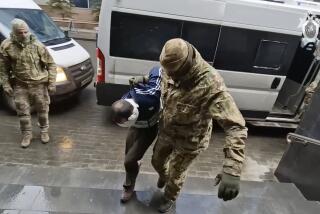Foes Agree to Try Ending Tajikistan’s 4-Year Civil War
- Share via
MOSCOW — The only war still raging in the former Soviet Union came a step closer to an end Monday when the president and the opposition leader of Tajikistan signed a tentative power-sharing accord and set a July 1 deadline to put it into force.
The agreement reached in Moscow calls for an immediate cease-fire, an amnesty, an exchange of war prisoners and the creation of a joint commission with powers to disarm opposition guerrillas, reshuffle the government and hold new parliamentary elections.
If carried out, the accord will pacify a remote Central Asian country where at least 30,000 people have been killed since 1992. It would put a halt to the last of half a dozen armed conflicts spawned indirectly by the collapse of Soviet central power.
Ethnic conflicts involving separatists in Chechnya, Moldova, Azerbaijan and two regions in Georgia have ended with victory by one side or with Russian intervention.
But the Tajik civil war, involving rival ideologies and regional clans, has persisted because neither side has had the strength to prevail or the will to compromise.
After years of broken cease-fires, however, Tajik President Emamali Rakhmonov and his leading foe, Sayed Abdullo Nuri, declared Monday that their small Muslim country and its 6 million people have suffered enough.
“The time has come to end this war,” Rakhmonov declared after a double handshake and an orange-juice toast with Nuri. “We cannot continue living this way.”
Nuri, a bearded Islamic leader who wore a skullcap to the signing ceremony, called the agreement historic. He urged exiles to return home and opposition guerrillas to join them in working to rebuild the country after what he called “a terrible nightmare.”
Rakhmonov, a former Communist apparatchik, and his Kulyabi clan seized power in late 1992 from an alliance of Islamic fundamentalists and democrats backed by warriors from two rival clans. The losers set up camps in neighboring Afghanistan and have bedeviled the country with guerrilla raids.
The war has turned one-tenth of Tajikistan’s population into refugees and caused billions of dollars in damage to what was already the poorest Soviet spinoff state.
Russia, which props up the Tajik regime with 25,000 border troops and costly economic aid, has been pressing Rakhmonov to settle the conflict. Russian diplomats rushed to help broker Monday’s accord just in time to give President Boris N. Yeltsin an achievement on his first day back in the Kremlin after six months of heart trouble.
The Tajik president was also under pressure from the guerrillas, who for much of this year held Tavil-Dara, the gateway to mountainous eastern Tajikistan, and who recently captured Garm, a regional center 25 miles north of there. For his part, Nuri received an appeal from guerrilla field commanders Sunday urging a settlement.
In a political step untried in their previous peace talks, the two leaders agreed to set up a “national reconciliation commission” to be made up of government, opposition and third-party delegates and headed by an opposition member.
The commission, scheduled to be named at the next round of talks Jan. 5, would oversee an amnesty for combatants and about 350 political prisoners, an exchange of about 800 war prisoners and the appointment of opposition figures to seats in a broader-based Cabinet. It could propose constitutional amendments for approval by voters in a referendum, and it would supervise a parliamentary election within 18 months. Its decisions would be binding on the government.
“This is an important beginning,” said Gerd Dietrich Merrem, the United Nations special envoy mediating the talks. “The opposition will start working with the government inside the country. They will not stay outside the country any longer.”
More to Read
Sign up for Essential California
The most important California stories and recommendations in your inbox every morning.
You may occasionally receive promotional content from the Los Angeles Times.













